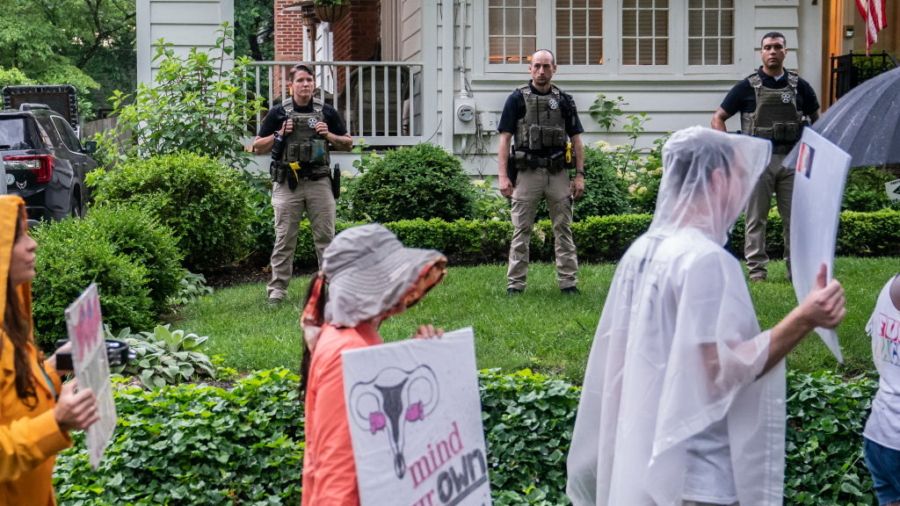The U.S. Supreme Court is asking for increased security spending after justices saw their homes targeted with protests and a possible assassination plot following the leak of a draft decision overturning the landmark Roe v. Wade abortion case last year.
The Supreme Court posted its budget request for fiscal year 2024 on Thursday. Along with several inflation-based pay and benefits increases, the new budget request called for increased spending on security for the court.
The budget request included $5,897,000 in additional spending for the “expansion of protective activities.” The Supreme Court requested another $585,000 for new IT security positions, which it said would pay for five new “cybersecurity, software development, and network engineering” positions.
NTD reached out to the U.S. Supreme Court for comment but did not receive a response before this article was published.
‘Evolving Risks’
“Ongoing threat assessments show evolving risks that require continuous protection,” the court said. “Additional funding would provide for contract positions, eventually transitioning to full-time employees, that will augment capabilities of the Supreme Court police force and allow it to accomplish its protective mission.”
In May of last year, Politico obtained and published a copy of a leaked draft Supreme Court decision in the Dobbs v. Jackson Women’s Health Organization case. The draft decision showed that the court was prepared to overturn precedents set by Roe v. Wade and Planned Parenthood v. Casey, which had extended federal protections for abortions.
After the draft decision leaked, pro-abortion activists protested outside of the Supreme Court and, later on, outside the homes of some justices. Activists specifically protested outside the homes of Chief Justice John Roberts and Associate Justices Brett Kavanaugh, Samuel Alito, Amy Coney Barrett, Neil Gorsuch, and Clarence Thomas, who supported the majority decision of returning the issue of abortion back to the individual states.
In June of last year, a California man was arrested near Kavanuagh’s home in Chevy Chase, Maryland, after he notified police that he intended to harm or kill Kavanaugh. The man, 26-year-old Nicholas John Roske, was arrested shortly thereafter. Police found a pistol, ammunition, a speed loader, a chest rig, a belly band holster, a black face mask, burglary tools, and other items in his possession at the time of his arrest.
Roske has since pled “not guilty” to charges of attempting to murder Kavanaugh, and his case is ongoing.
Hours after the Supreme Court issued its decision on abortion in Dobbs v. Jackson Women’s Health Organization, a 20-year-old Texas man, Mikeal Deshawn Archambault, allegedly shared a tweet indicating his intent to kill members of the Supreme Court.
Protests have continued outside the homes of Supreme Court justices in the months since they gave their abortion ruling, and pro-life organizations and churches have been targeted with vandalism.
DOJ Response
The Supreme Court’s request for additional security also comes as the U.S. Department of Justice has declined to prosecute those who protested outside the justices’ homes despite the fact that such protests may violate federal law.
Section 1507 of Title 18 of the U.S. Code states that obstruction of justice can include “pickets or parades in or near a building housing a court of the United States, or in or near a building or residence occupied or used by such judge, juror, witness, or court officer, or with such intent uses any sound-truck or similar device or resorts to any other demonstration in or near any such building or residence.”
In October, the Heritage Foundation filed a lawsuit against the DOJ over its apparent failure to prosecute protesters marching outside the homes of Supreme Court justices. The lawsuit specifically accused the DOJ of ignoring a Freedom of Information Act request seeking DOJ internal documents that might explain the department’s inaction against these protesters.
In a Senate hearing earlier this month, Attorney General Merrick Garland said that while he wasn’t aware of any arrests against those protesting outside justices’ homes, he had ordered 24/7 protection of each justice by the U.S. Marshal Service after threats began to emerge. After Sen. Ted Cruz (R-Texas) asked how the DOJ determines which statutes to enforce or not enforce, Garland said U.S. Marshals on the scene outside justices’ homes were the ones deciding whether or not to arrest or charge people.
NTD reached out to the DOJ for comment but did not receive a response before this article was published.

